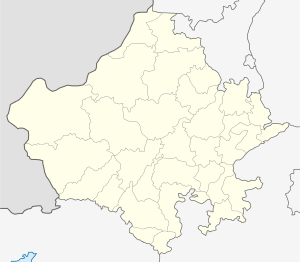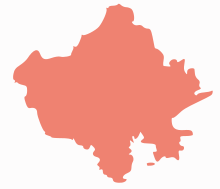Tonk, India
| Tonk | |
|---|---|
| City | |
| Nickname(s): Nawabi Nagari | |
 Tonk  Tonk | |
| Coordinates: 26°10′N 75°47′E / 26.17°N 75.78°ECoordinates: 26°10′N 75°47′E / 26.17°N 75.78°E | |
| Country | India |
| State | Rajasthan |
| District | Tonk |
| Government | |
| • Body | Nagar Parishad |
| Elevation | 289 m (948 ft) |
| Population (2011) | |
| • Total | 165,363 |
| Languages | |
| • Official | Hindi |
| Time zone | UTC+5:30 (IST) |
| ISO 3166 code | RJ-IN |
| Vehicle registration | RJ-26 |
| Website |
www |
Tonk is a town in the Indian state of Rajasthan. The town is situated 95 km (60 mi) by road south from Jaipur, near the right bank of the Banas River. It is the administrative headquarters of Tonk District. Tonk was also the capital of the eponymous princely state of British India from 1817 to 1947.
Demographics
In the 2011 Indian census,[1] Tonk had a population of 165,363, 48% female. 14% is under age six. Tonk has an average literacy rate of 69.47%, 78.7% in males, and 59.85% in females.
History
The founder of the state was Nawab Muhammad Amir Khan (1769-1834), an adventurer and military leader of Pashtun descent from Afghanistan. Amir Khan rose to be a military commander . In 1806, Khan received the state of Tonk from British Government.[2] In 1817, after the Third Anglo-Maratha War, Amir Khan submitted to the British British East India Company, he kept his territory of Tonk and received the title of Nawab.[3]
During the regime of Nawabs, the natives were invited to an Islamic function of Milad-un-nabi without regard to caste, color or creed. It was organised by the ruling Nawabs for a period of seven days in the month of Rabi al-awwal.
The founding ruler of Tonk was Nawab Muhammad Amir Khan (1769-1834). Tonk was known as Samwad Lakshya in the Mahabharat period. In the Mauryan regime, it was under the Mouryas and then it was merged into Malvas. Most of the period was under Harsh Vardhan. According to Huen Tsang, visitor to China, it was under Bairath State. In the regime of the Rajputs, this state was under, Solankis of Toda and later Kachvahs took over when Man Singh defeated the Rao of Toda . Later, it was under the regime of King Holkar and Sindhia.
In 1806, Amir Khan conquered it, taking it from Balvant Rao Holkar. The British government captured it in turn. Under the treaty of 1817, the British government returned it to Amir Khan. Tonk was founded in 1818 by an Afghan military leader who was granted land by the ruler of Indore.
See also
References
- ↑ "Census of India 2011: Data from the 2011 Census, including cities, villages and towns (Provisional)". Census Commission of India. Retrieved 2008-11-01.
- ↑ https://books.google.co.in/books?id=7iOsNUZ2MXgC&pg=PA542&lpg=PA542&dq=holkar+tonk&source=bl&ots=Zj5giwpky1&sig=2yN7DqZNzsAAWhfiVgy7FvbrQ04&hl=en&sa=X&ved=0ahUKEwil4u-p4__NAhXFt48KHYThDLcQ6AEIVDAJ#v=onepage&q=holkar%20tonk&f=false
- ↑ Princely States of India
External links
| Wikisource has the text of the 1911 Encyclopædia Britannica article Tonk. |
